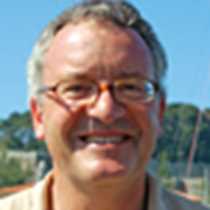At Sea
We spent the day sailing westwards along the Barbary Coast of north Africa towards what the Muslim world knows as the West: both Maghrib (the Arabic for Morocco) and Algarve (the coastal region of southern Portugal that we visited at the start of this voyage) are named after this point of the compass, itself an Arab invention. We are moving in the direction of that first great expansion of Islam that took place within a century of Mohammed's death, running along the entire coast of north Africa to cross into Europe using Gibhal Tariq (Gibraltar, to us) as a stepping stone. By the end of the ninth century, the whole of the Iberian peninsula (modern day Spain and Portugal) was under Muslim control; indeed it was at Poitiers, beyond the Pyrennees in modern France, that Charles Martel succeeded in halting the advance.
It was Moors, from Morocco, who had converted to Islam, rather than Arabs, who brought Islam to Iberia. Moorish Spain saw a cultural flowering unparalleled in early mediaeval Europe. As the rest of continental Europe clawed its way out of the Dark Ages, the learning of the Andalusian cities of Cordoba, Seville and Granada was unsurpassed. We owe this civilization a considerable debt. Our mathematics uses Arabic numerals, the Arabs having devised both the concepts of zero and of place value to facilitate an additive system. Algebra, as the word implies, is another gift from the Arab world, as is chemistry (originally, alchemy) and it was the distillation of Medina rose water that gave us, ironically, alcohol. The Muslim need to establish the Quiblah (that is, the direction of the Ka'aba in Mecca) for their daily routine of prayer, from wherever in the world they found themselves, soon gave them a detailed knowledge of astronomy and trigonometry. These disciplines enabled them in turn to become skilled navigators and civil engineers.
Thus, when Henry the Navigator opened his navigation school at Sagres it was with a view to harnessing the arts and sciences of the Muslim world in the service of Portugal. Likewise, Columbus could not have reached the New World without the caravel and its lateen sail, the astrolabe and the quadrant, the lenses and mirrors of the Arab navigators. As the Voyages of Discovery heralded the end of the Middle Ages and the beginning of what we now call globalization, the triumphant progress of Christian Europe beyond the Pillars of Hercules was securely rooted in the achievements of a rival civilization.
We spent the day sailing westwards along the Barbary Coast of north Africa towards what the Muslim world knows as the West: both Maghrib (the Arabic for Morocco) and Algarve (the coastal region of southern Portugal that we visited at the start of this voyage) are named after this point of the compass, itself an Arab invention. We are moving in the direction of that first great expansion of Islam that took place within a century of Mohammed's death, running along the entire coast of north Africa to cross into Europe using Gibhal Tariq (Gibraltar, to us) as a stepping stone. By the end of the ninth century, the whole of the Iberian peninsula (modern day Spain and Portugal) was under Muslim control; indeed it was at Poitiers, beyond the Pyrennees in modern France, that Charles Martel succeeded in halting the advance.
It was Moors, from Morocco, who had converted to Islam, rather than Arabs, who brought Islam to Iberia. Moorish Spain saw a cultural flowering unparalleled in early mediaeval Europe. As the rest of continental Europe clawed its way out of the Dark Ages, the learning of the Andalusian cities of Cordoba, Seville and Granada was unsurpassed. We owe this civilization a considerable debt. Our mathematics uses Arabic numerals, the Arabs having devised both the concepts of zero and of place value to facilitate an additive system. Algebra, as the word implies, is another gift from the Arab world, as is chemistry (originally, alchemy) and it was the distillation of Medina rose water that gave us, ironically, alcohol. The Muslim need to establish the Quiblah (that is, the direction of the Ka'aba in Mecca) for their daily routine of prayer, from wherever in the world they found themselves, soon gave them a detailed knowledge of astronomy and trigonometry. These disciplines enabled them in turn to become skilled navigators and civil engineers.
Thus, when Henry the Navigator opened his navigation school at Sagres it was with a view to harnessing the arts and sciences of the Muslim world in the service of Portugal. Likewise, Columbus could not have reached the New World without the caravel and its lateen sail, the astrolabe and the quadrant, the lenses and mirrors of the Arab navigators. As the Voyages of Discovery heralded the end of the Middle Ages and the beginning of what we now call globalization, the triumphant progress of Christian Europe beyond the Pillars of Hercules was securely rooted in the achievements of a rival civilization.




